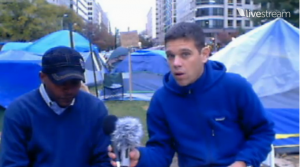
Taxi leader Haimanot Bizuayehu speaks with TheFightBack's Pete Tucker at Occupy DC at McPherson Square on K Street
LISTEN TO HAIMANOT BIZUAYEHU:
Audio clip: Adobe Flash Player (version 9 or above) is required to play this audio clip. Download the latest version here. You also need to have JavaScript enabled in your browser.
“I share their ideas,” D.C. taxi leader Haimanot Bizuayehu told TheFightBack in an Oct. 28 interview at Occupy DC at McPherson Square. Inspired by the occupation of Wall Street, the K Street park has been occupied since Oct. 1. Bizuayehu said of the 99 Percenters, they are asking “the government to pay attention [to] the large majority of the public, the people who are struggling under this tight economy. [While] regular people are suffering, the only people who are advantaged at this time are those [at the] corporate level.”
Bizuayehu, who’s a board member of The Small Business Association of DC Taxicab Drivers, knows something about struggling against corporate control. D.C. drivers recently beat back a taxi medallion bill which would have eliminated 4,000 jobs and threatened to turn the city’s drivers, most of whom are independent owner/operators, into employees of a few large companies.
Citing a 2010 study conducted by the D.C. Chief Financial Officer, the Washington Post noted that when the medallion system has been implemented in other cities it has led to “windfall profits for a small group of people; an overall decline in service with longer waits and higher fares; and a system open to corruption.”
While the medallion bill has been defeated, at least for the moment, drivers face many other challenges, including one of the lowest rate structures in the country. “Making ends meet now… is getting very difficult,” said Bizuayehu.
Drivers have to struggle not only to survive, but also to have their voices heard. Directly overseeing the city’s taxi industry is the D.C. Taxicab Commission. By law, the nine-member DCTC must have three industry representatives, but presently it has none, notwithstanding official claims to the contrary.
“I’ve been driving for sixteen years [and] I don’t remember the time where taxicab drivers were represented according to the law,” Bizuayehu said. “We are asking the administration and the Taxicab Commission to abide by the law… We are not asking them any favor at all.”
There’s also the issue of driver safety, or a lack of it. Being a cab driver “is a very difficult and very dangerous job,” said Bizuayehu. This point was driven home with the recent murder of Domingo Ezirike, a 40-year-old Prince George’s County taxi driver. “Many cab drivers get robbed,” said the D.C. taxi leader. But many drivers “don’t report it because they don’t get [much] help from law enforcement officials.”
The problems facing drivers could be handled by the DCTC, but under acting chair Ron Linton drivers continue to be left out of the process, said Bizuayehu. “We’ve been told it’s a new day, and we are still waiting to see that new day.”
Related Stories:
In Defiance of Mayor, New Taxi Chair Continues with Past Practice, Aug. 21, 2011
The Voice of DC Cab Drivers: Taxi Leader Haimanot Bizuayehu, Aug. 8, 2011
Medallions May be a Trojan Horse for D.C. Taxicab Industry, March 17, 2011
